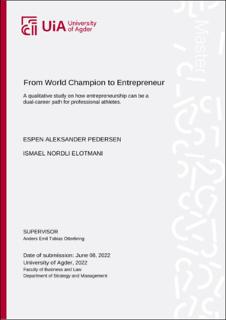| dc.description.abstract | The purpose of this master's thesis has been to find answers on how one can teach entrepreneurship to athletes in light of existing literature on sports entrepreneurship, personality traits, design-thinking working methods and educational frameworks. In this study, we try to answer how professional athletes' ability to learn entrepreneurship could contribute on a route to becoming successful athletes and promising entrepreneurs during, and after their careers.
We build our discussion on teaching entrepreneurship through Valerio et al. (2014) framework for entrepreneurship education, which distinguishes between entrepreneurship education at the college and university level and entrepreneurship training programs. The framework emphasizes different personal challenges for how a person can learn entrepreneurship. We look at how to facilitate a group that does not fall into any category for education, namely athletes, with their unique lifestyle and uncertainty in their careers. With this as a basis, we have interviewed seven professional athletes, some at the top of their careers now and others who have finished their athletic careers. This forms the basis for our qualitative study of professional athletes and their opportunity to become entrepreneurs. Through a holistic approach, we seek to answer the following problem statement:
"What prerequisites do professional athletes have to learn entrepreneurship?"
Our study shows that professional athletes may lack innovativeness due to a rigid training regime. Despite that, the teaching methods of design thinking could contribute to opportunities to learn entrepreneurship. Another result was that professional athletes might be conflicted by the uniqueness of sports, which provides a need for customized teaching methods for this specific group of people. The conclusion is that there should be a tailor-made educational program for professional athletes who want to learn about entrepreneurship. By adapting the working methods of an entrepreneur in their sports performance or when their career is over, athletes can contribute to society with their resources and ideas. | |
